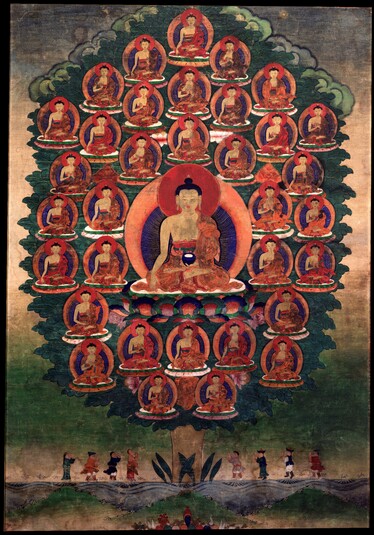
Item: Shakyamuni Buddha - with the 35 Buddhas of Confession
| Origin Location | Tibet |
|---|---|
| Date Range | 1800 - 1899 |
| Lineages | Buddhist |
| Material | Ground Mineral Pigment on Cotton |
| Collection | Private |
Classification: Person
Appearance: Buddha
Gender: Male
Shakyamuni Buddha (Tibetan: sha kya tu pa, sang gye. English: the Enlightened One, Sage of the Shakya Clan) together with the Thirty-five Confession Buddhas.
The Sutra of the Three Heaps, in Sanskrit the Triskhandhadharmasutra, or briefly the Triskandha Sutra (phung po gsum pa'i mdo), is a Mahayana ritual text used primarily by monks and nuns for the purpose of confession of downfalls which means transgressions against the vinaya and bodhisattva vows. The central object of worship is the Thirty-five Confession Buddhas, including Shakyamuni Buddha. The name of the sutra follows from the three principal sections of the text: 1) homage, 2) confession, and 3) and dedication. There are other texts on confession found in the various Mahayana Sutras however none of those appear to have any representations in Himalayan and Tibetan art.
There are two traditions of Mahayana Buddhism that include the Thirty-five Confession Buddhas as a key element in ritual and visualization practice. The two are the Yogachara and Madhyamaka philosophical systems of Mahayana Buddhism. Two distinct ritual systems for bestowing the Bodhisattva Vows have developed from these two traditions and both incorporate the visualization of the Thirty-five Buddhas along with the recitation of the Confession Sutra.
In Himalayan and Tibetan art there are at least three different iconographic systems for depicting the individual Thirty-five Confession Buddhas. The principal authors of commentaries and ritual texts were Nagarjuna (not necessarily the famous Nagarjuna), Sakya Pandita and Je Tsongkapa along with a number of others. The TBRC website lists approximately sixty texts associated with the practice of the Confession Buddhas.
Jeff watt 7-2011
Subject: Confession Buddhas without Attributes
Subject: Thirty-five Confession Buddhas Main Page
Collection: Private 5
Subject: Number Sets - Most Common
Subject: Number Sets - Mahayana Buddhism
Subject: Purification Deities Page
Subject: Three Secrets of Himalayan Art
